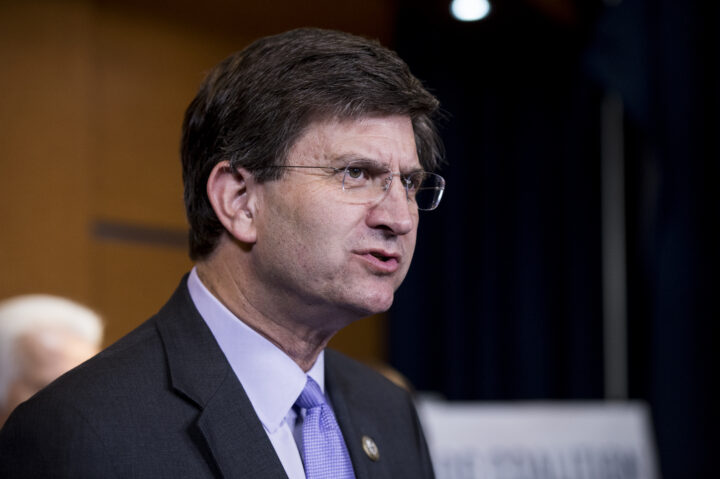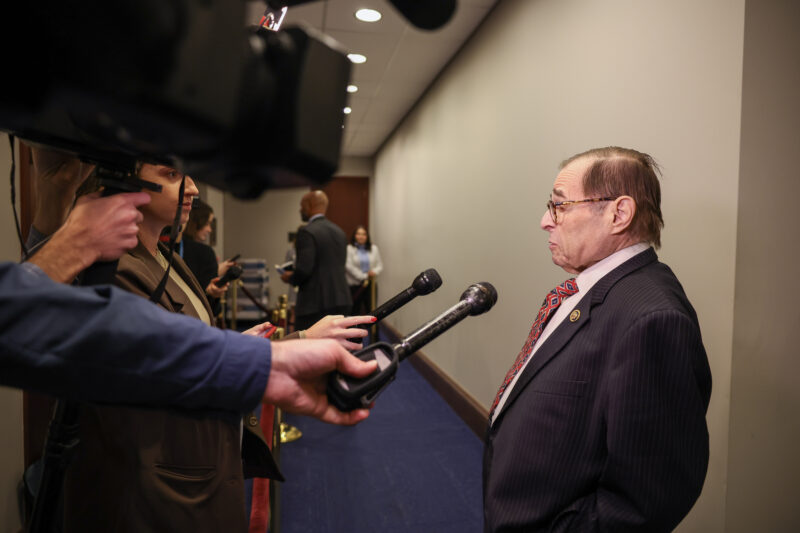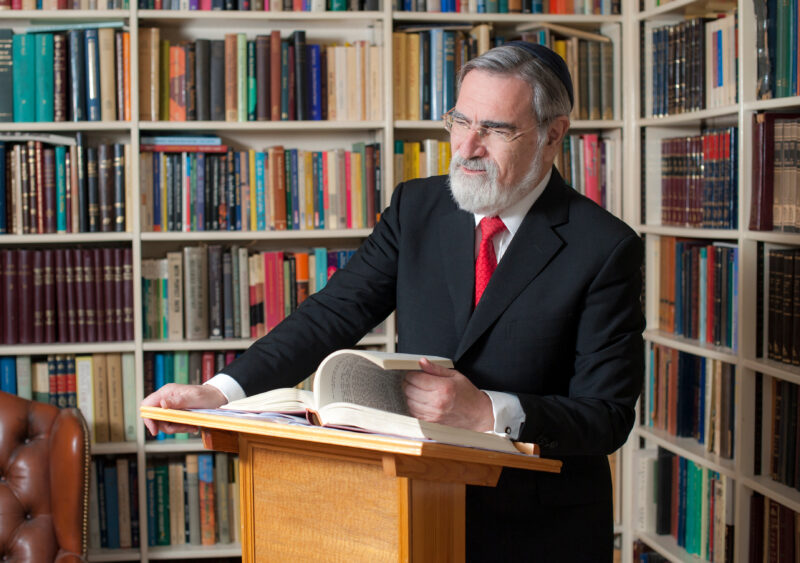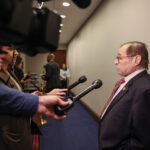Democrats discussed Gaza aid, day-after plans with Israeli leadership, Schneider says
Rep. Brad Schneider told JI that a recent Democratic delegation to Israel conveyed continued bipartisan U.S. support as well as concerns about Israel’s conduct

Bill Clark/CQ Roll Call
Rep. Brad Schneider (D-IL)
A group of congressional Democrats visiting Israel this week, including 11 first-term lawmakers, pressed Israeli leaders on the humanitarian situation in the Gaza Strip, emphasizing the need for them to increase aid flows into the enclave, Rep. Brad Schneider (D-IL) told Jewish Insider on Wednesday.
Schneider said the “focus of the trip, without question, was understanding Israel’s existential war against Hamas — Hamas attacked on Oct. 7 … understanding the implications of that. But also understanding the humanitarian crisis that’s taking place in Gaza.”
He said the group’s meetings, including with Israeli Prime Minister Benjamin Netanyahu, focused on the humanitarian crisis, the obstacles to providing aid and how to to increase aid flows.
“We are committed to resolving the war in Gaza. That means bringing back the hostages … and we need to bring them back with great urgency, while at the same time we’re committed to getting aid into Gaza,” the Illinois Democrat said.
Schneider, the co-chair of the Congressional Jewish Caucus, has been a key Democratic supporter of Israel in the House, but has also been increasingly vocal about the humanitarian crisis in Gaza and of Israel’s plans to further expand its war operations, finalized last week.
“We need more locations, we need more distribution points, we just need more aid,” Schneider told JI. “We’re committed to trying to do everything we can, and we pressured the Israeli government to continue to do more, and we’ll continue to do that. This was very informative — the ability to be on the ground to see what’s happening, to better understand the challenges.”
He emphasized that Israel is providing aid in Gaza, but recent United Nations statistics confirmed that the vast majority of U.N.-facilitated aid is being diverted from its intended destinations inside the enclave.
“There are great challenges, but that doesn’t change the fact that there is a crisis that needs a response,” Schneider said. “Israel is part of that response. The U.S. has a role, as do other nations, our allies.”
The lawmaker said they also met with opposition leader Yair Lapid, whom Schneider said delivered a similar message to the group: that “as [Israel] fights Hamas, and works to defeat its enemy that is sworn to destroy Israel and kill all Jews, not just in Israel but around the world — the people of Gaza are not the enemy.”
In addition to Israeli political leaders, the group met with leadership from the World Food Program, the Gaza Humanitarian Foundation and COGAT, the Israeli military division that coordinates aid moving into Gaza.
The group also discussed the aid issue at length with U.S. Ambassador to Israel Mike Huckabee.
Regarding the future of the war in Gaza, Schneider said that Netanyahu delivered a similar message in their private meeting as in public — that he has a plan to bring the war to an end. He added that Lapid, in their conversation, accused Netanyahu and his administration of acting without a plan.
“My view has not changed about the idea of occupying all of Gaza or even going in and occupying Gaza City,” Schneider said. “I think the best thing for Israel, for the Palestinians, for the region is to bring the war to a conclusion.”
He added that Hamas is the only party that wants to see the war continue, and it “has the power to end the war tomorrow” by surrendering and releasing the hostages. He added that the U.S. and its Arab partners are working “very hard” to put more pressure on Hamas, but said that the post-war plan is also critical.
“It’s not just ending the war, it’s what happens on the day after. And we need to make sure that we have that plan laid out just as much. That’s why, in all my conversations and my colleagues’ conversations, we were asking that question,” Schneider said.
He said that he and the other lawmakers sought to send the message that the U.S.’ commitment to Israel’s security “remains solid and bipartisan.”
Schneider said that the meeting with Netanyahu, which lasted for an hour and a half, touched on a series of other issues, including a 16-year-old Palestinian-American detained for allegedly throwing rocks at Israeli settlers, Israeli settler violence and the need to free the hostages — which Schneider said Netanyahu conveyed he was committed to doing.
The trip also included a visit to Ramallah, where the lawmakers spoke with Mohammad Mustafa, the prime minister of the Palestinian Authority, and other PA leaders. Schneider, who has met with PA leaders on numerous occasions, said that this was the “most constructive conversation” he’s had with them.
He said Mustafa expressed a commitment to a two-state solution, to finding a path to peace and to implementing necessary reforms, including to the PA’s terror payments policy. Schneider also noted the Palestinian cabinet ministers are largely a new group installed last year. But, he added, the PA lacks credibility with the Palestinian people and is widely seen as corrupt.
“They seem to be taking those steps, but they need to be concrete,” Schneider said. “They need to demonstrate a commitment to good governance, a commitment to addressing their finances and being a partner for peace that really hasn’t been there for a very long time. So it was very positive.”
The trip comes at a time of intense strain in the relationship between the Israeli government and congressional Democrats. Schneider said that, in such a moment, it was important for the Democratic freshmen to learn about the situation on the ground.
“You’re getting a broad perspective and understanding that Israel is America’s best ally in a very important region for us, that we can strengthen that relationship,” he said. “It is fair for people to be critical of actions — Democrats are critical of our own government, Democrats can be critical of Israel’s government, and we should have expectations of our allies.”
But he added that the trip also addressed hopes for a more positive future, focused on the Abraham Accords, and that his colleagues heard about that “commitment to peace” and to finding a path toward expanding normalization.
“The vision and promise within the Abraham Accords is for an entirely different region where Muslims, Jews, Christians, Israelis, Arabs, Emiratis, Jordanians, etc., live together in peace, building a better future for all of their children and their countries,” he said. “That can’t happen until we get through the barrier of the enemies of peace. Hamas is an enemy of peace. Hezbollah. Iran. We can’t let them win.”
The Democrats visited the Gaza envelope together with a Republican delegation that overlapped with the Democrats’ visit for part of last week, going to some of the communities hit hardest in the Hamas attacks and visiting an overlook to Gaza.
Schneider said that, in their meetings, in addition to the situation in Gaza, the Democratic lawmakers had discussed the range of other existential threats that Israel faces from its various regional enemies.
“Israel can’t afford to stumble, and the U.S. and Israel have to remain vigilant and stand strong together,” Schneider said.
The group visited the Israeli border with Syria and received a briefing on the situation in the country. Schneider said that the path forward in Syria is “uncertain” and that the exact shape and intentions of the new Syrian regime remain unclear.
He said that “everyone we talked to supported the idea of lifting the sanctions on Syria and giving [President Ahmed Al-Sharaa] a chance to succeed” and described Israel as supportive of the U.S. approach of working with the new Syrian government.
Schneider added that the atrocities committed against the Alawites and Druze in Syria by government-aligned forces — in response to which Israel carried out strikes on several key Syrian government facilities in Damascus — were comparable to those of the Oct. 7, 2023, attacks.
“It can change in an instant,” Schneider said. He said that there’s a “chance for a more constructive and positive future” if the Syrian government is willing to represent and embrace the diverse groups that make up Syrian society.
Regarding the recent Israeli and American strikes on Iran’s nuclear program, Schneider emphasized the “broad support” for those efforts in Israel, including from Lapid.
“One of the reasons that the moment was right to strike Iran is because their defenses were diminished, but their capabilities were on the cusp of becoming exceedingly more threatening and more dangerous,” Schneider said. “We had a good step, and we need to get to a next step, which is not just moving Iran back from the threshold nuclear capabilities, but closing every pathway Iran might pursue towards a nuclear weapon.”
He said that the coming months, particularly ahead of the expiration of the snapback mechanism for the United Nations sanctions on Iran, will be critical.





































































